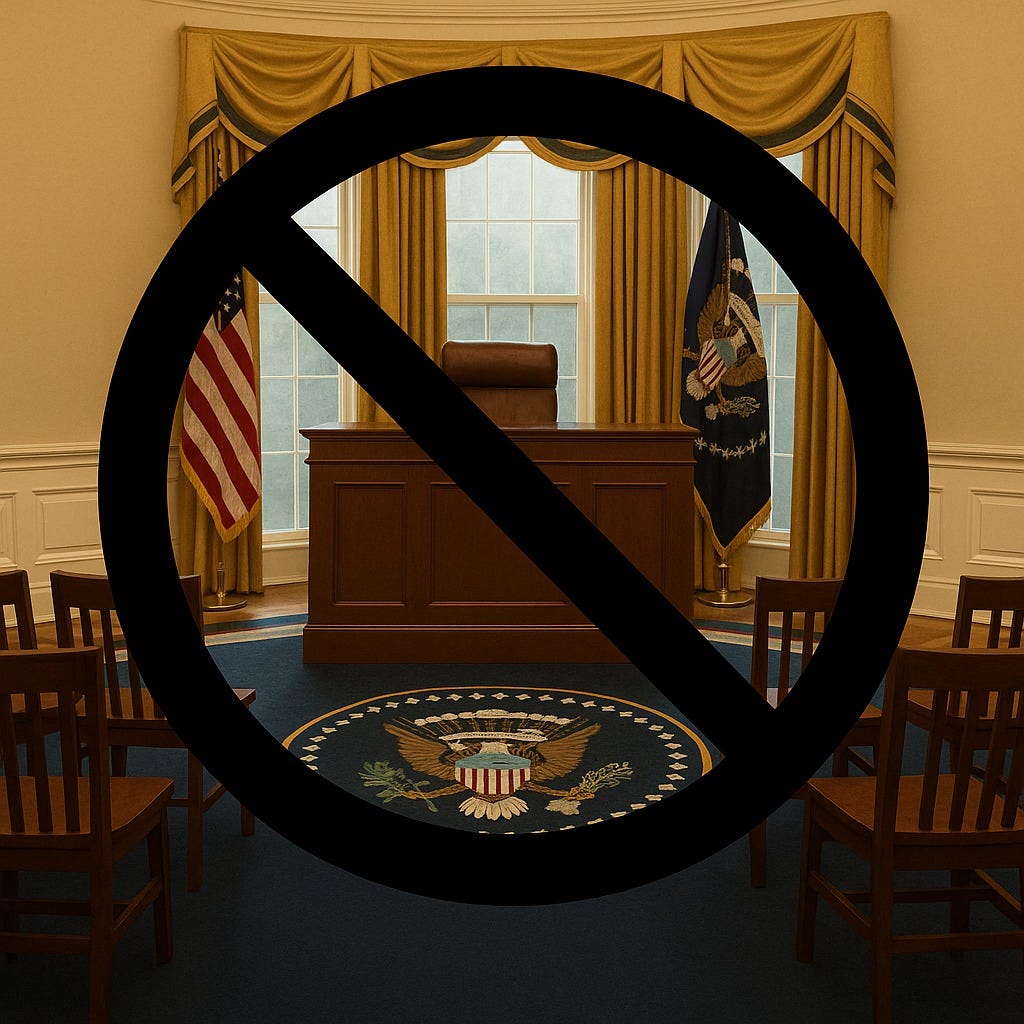✍️ The Oval Office Isn’t a Courtroom
How executive overreach is echoing bills of attainder—punishing without trial
The president isn’t a judge or a jury.
Yet just days ago, legal experts warned that the U.S. Department of Justice—in the hands of the current president—has become a weapon of political retribution. Prosecutors have been fired mid-case, political opponents targeted with retaliatory investigations, and critical independent institutions threatened.
Trump is using federal power to go after institutions and individuals he sees as threats. He doesn’t like what they stand for.
This is not new. In May, the administration ordered federal agencies to blacklist certain law firms, media outlets, environmental groups, and universities. They are stripping contracts, funding, and access in what many saw as retaliation for opposing Trump.
His tactics? Threats, selective enforcement, defunding, smears, and retaliation. No evidence. No trials. Just punishment.
That’s not leadership. That’s intimidation. That’s vengeance. And it echoes a form of government abuse the U.S. Constitution was written to prevent.
Our Constitution says no
The U.S. Constitution was designed to prevent this kind of abuse. It bans bills of attainder—laws that punish people without trial. Congress can’t pass them (Article I, Section 9) and neither can state legislatures (Section 10).
Information about those two sections briefly disappeared from the congressional website for several hours on Aug. 6—an unexplained outage that raised alarms about transparency and accountability. That incident is a reminder of why the Founders included these protections in the first place.
Why? Because the Founders saw how kings and parliaments in England used this power to crush dissent—without letting people defend themselves.
As Justice Hugo Black wrote in United States v. Lovett (1946), the Bill of Attainder Clause exists “to prevent trial by legislature, to forbid punishment without judicial trial.” That principle—that no one should be punished by government without due process—is at the heart of a free society.
Justice Frank Murphy, concurring in the same case, put it even more bluntly:
“The Bill of Attainder Clause seeks to safeguard the individual from tyranny in its most palpable form—legislative proscription by name.”
Some later rulings have emphasized the clause’s role in maintaining the separation of powers. But at its core, the Bill of Attainder Clause is about protecting people from unfair punishment by the government—the kind we’re seeing again today.
In short: punishment without process is un-American.
Even without a law, it’s still wrong
Technically, this clause limits Congress, not the president. But the principle is bigger than the wording.
When a president uses executive agencies to punish political opponents or critics without due process, it may not be a bill of attainder. But it mirrors one. And that violates the spirit of the Constitution.
It also violates our fundamental commitment to fairness, justice, and democracy. We are a nation of laws, not of rulers.
We must speak out
This is not normal. It’s authoritarian. Plain and simple. We must not treat it as routine politics.
We must support and defend the institutions that stand up to abuse—journalists, law firms, advocacy groups, watchdogs, and principled public officials. We must encourage other leaders—businesspeople, educators, clergy, legal professionals, and civic organizers—to speak up and push back.
No branch of government should wield power to destroy individuals or organizations by decree. Congress won’t act unless we push them. The courts won’t do it alone. And the Constitution doesn’t enforce itself.
We’re paying attention—and we’re not staying quiet.
Silence is complicity, and complicity invites the very tyranny our Constitution was written to prevent.
Related Commentaries
Habeas Corpus: A Cornerstone of Our Liberty ➤ Looks at another constitutional safeguard—against unlawful detention—and how information on its protections briefly disappeared from public view on Aug. 6.
What’s a Foreign Gift Worth? The Constitution Says: Not Our Democracy ➤ A companion commentary on how constitutional safeguards against corruption—and the public’s access to information about them—are also at risk.
Take Action
🏛️ Contact Information: Washington's U.S. Senators and Representatives
🏛️ Contacting Washington State Officials & Key Departments
🧰 Suggested Text for Writing Email Messages to Elected Officials—also useful for phone calls!
🧰 Online Guides for Writing Letters to the Editor
🟦 Executive Overreach & Abuse of Power—a ranked guide to organizations resisting authoritarianism and defending democratic norms.
🟦 Legal Resistance for Justice—a ranked guide to legal groups challenging anti-democratic policies and abuses of power.
Share
If my commentary resonates with you, please share it with friends.
Subscribe
Get new posts from Plainly, Garbl delivered to your inbox.


